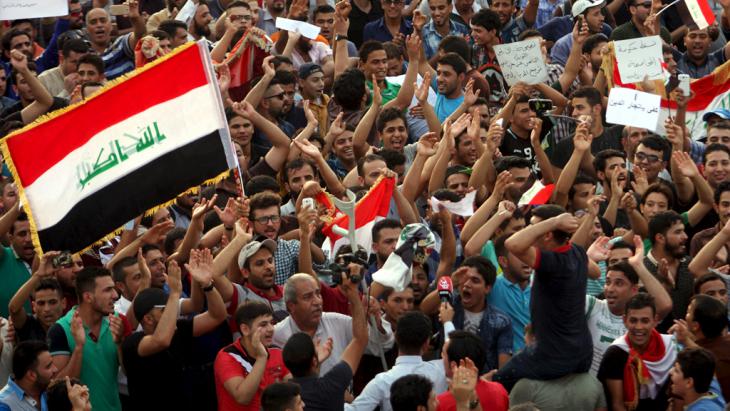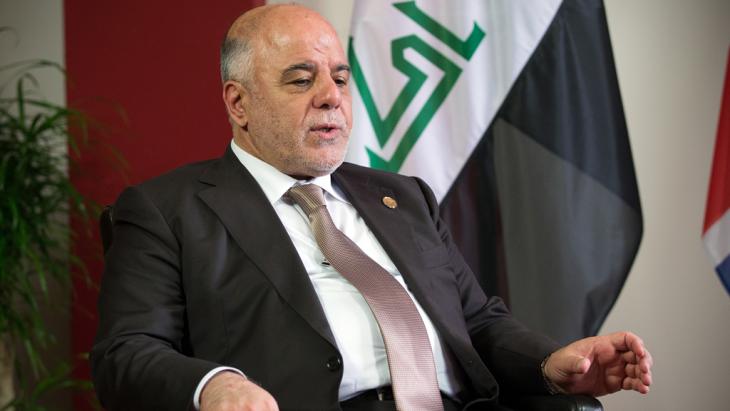Caught in the spotlight

It started with the soaring temperatures of the Iraqi summer and blackouts leaving people with no air-conditioning. Then there were the more deeply-rooted and structural problems of Iraq′s post-Saddam political class. So August became a month of anti-corruption protests, also aimed at the lack of services, politically imposed sectarianism and the lack of wealth redistribution. Those who took to the streets this time, however, were not members of the Sunni but rather of the Shia community. Loud demonstrations could be heard on the streets of Baghdad, Karbala, Najaf, Nasiriyah and Basra.
Thousands of Iraqis initially applauded Prime Minister al-Abadi′s efforts and the reforms implemented at the beginning of August. But the energy to reform waned quickly, the administration worn out by the Islamist offensive being waged by IS, as well as by the ongoing institutional and political stalemate. For years Iraq has infamously held pole position at the top of the global league table for internal corruption, which, added to the absence of any planned reconstruction, is playing into the hands of jihadist propaganda.
The latest demonstrations have spawned a spontaneous protest movement, at the present time confined to a handful of cities. It draws on the many different facets of Iraqi society, ranging from secular and religious movements to individuals, liberals and communists. It is a movement flying just one flag – the Iraqi flag.
Obstacle to change
Iraq′s political establishment with its nepotism and different factions is proving an obstacle to change. It has the country in a stranglehold, at the same time preventing implementation of the reforms called for by Prime Minister al-Abadi. In contrast to the nepotism favoured by his predecessor Nouri al-Maliki, the premier has been calling for transparency and honesty for over a year. For the moment it seems all his attempts have been in vain – slowed inevitably by the Islamist invasion of a third of the country and resistance from Iraq′s many covert centres of power.

The most recent announcement on Friday 28 August concerning the re-opening of Baghdad′s Green Zone is at best symbolic. Rescinding the closure of an area that has been fortified for over a decade is intended to indicate a return of authority to the central government, which is trapped between more or less antagonistic political and paramilitary groups. Since the Green Zone also contains the foreign embassies (including that of the U.S.), Iraqi administrative and military offices as well as the state parliament, it is also of tangible benefit.
It is a decision that followed parliamentary approval of the premier′s reform package. The latter envisages abolishing one third of the government′s ministries, slashing many deputy ministerial and secretarial positions, curbing the worst bureaucratic excesses, promoting greater transparency in the administration of state power, fighting corruption and supporting judicial inquiries. These are brave decisions, but they will have little impact on the internal balance of power as the parliamentary majority is firmly in the hands of the Shias (52% of seats), with Kurds holding 17% and the Sunnis 21%.
Politically explosive
Western media is paying little attention to an issue fraught with explosive potential. This protest movement may be popular and anti-sectarian, but it also features elements that are potentially divisive. Firstly there is the well-known Shia religious leader Muqtada al-Sadr, who last week rallied his Peace Brigades, not to mention the former Mahdi army, which caused so much unrest during the post-Saddam U.S. occupation. After Friday prayers, hundreds of al-Sadr′s supporters were in Baghdad to mingle with the thousands of protesters, thereby adding a religious element to the Iraqi flag in a clear attempt to hijack the protest. To date, however, political activists and supporters belonging to the movement have managed to quell any such attempts to muscle in on the demonstrations.

Speaking in Najaf on Monday 24 August, al-Sadr had said, ″All people and all Sadrists must attend Friday′s protest in Baghdad. Sadrists must join other protesters as one single, Iraqi, national group.″ Commandeering a mass protest would further strengthen the role of the thousand-strong militia – a group that, unlike many other Shia brigades, keeps its distance from Iran, a country clear in its desire to influence political and military decisions in Baghdad.
Shias divided
Shia political parties, torn between supporting and suffocating the movement, are also fighting for influence over the protesters. In both cases the objective is clear: their intention is to prevent the protest from questioning their interests.
Ayatollah al-Sistani, Iraq′s most influential religious personality, recently issued a warning on the potential consequences. Often reluctant to publicly address political issues, al-Sistani came out in support of the efforts made by al-Abadi at the end of August, and warned of the potential danger posed by Iraq′s many internal players.
Many political groups are currently at work in the country to undermine al-Abadi′s reform programme. There are also many who are exploiting the chaos provoked by the presence of IS to increase the already very real internal sectarianism, fomenting a fragmentation of Iraq into ethnicities and religions. This would no doubt benefit those, in Iraq and abroad, whose ultimate aim is an end to national unity and the creation of smaller, weaker federal states, which would thus be easier to control.
Chiara Cruciati
© ResetDoc 2015
